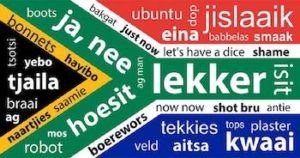
*Afrikaans (language) is celebrated on this date in 1600. This is a West Germanic-based Creole language spoken in South Africa, Namibia, and, to a lesser extent, Botswana, Zambia, and Zimbabwe.
It evolved from the Dutch vernacular of Holland spoken by the European (Dutch, French, and German) colonizers and their slaves in South Africa. This is where it gradually began to develop distinguishing characteristics during the 18th century. It is a developed Creole language. Some Afrikaans linguistics researchers maintain that Afrikaans, initially a peasant language, is only partially Creole. The term is derived from the Dutch term Afrikaansch (now spelled Afrikaans), meaning "African." It has been described as a Dutch-based creole in various ways.
The Afrikaans language arose during the Middle Passage in the Dutch Cape Colony through a gradual divergence from European Dutch dialects during the 18th century. As early as the mid-18th century and as recently as the mid-20th century, Afrikaans were known in standard Dutch as a "kitchen language," lacking the prestige accorded, for example, even by the educational system in Africa, to languages spoken outside Africa. The slave labor business dealings of the Dutch West India Company, the Danish West India Company, and others exposed indigenous Africans to this language culture.
Other early epithets setting apart as putatively beneath official Dutch standards included geradbraakt, gebroken, and onbeschaafd Hollands ("mutilated/broken/uncivilized Dutch"), as well as verkeerd Nederlands ("incorrect Dutch"). Although Afrikaans have adopted words from other languages, including German and the Khoisan languages, an estimated 90 to 95% of the vocabulary of Afrikaans is of Dutch origin. Therefore, differences with Dutch often lie in the more analytic-type morphology and grammar of Afrikaans and a spelling that expresses Afrikaans pronunciation rather than standard Dutch.
The two languages are highly mutually intelligible, especially in written form. Afrikaans is the third-most-spoken language in the country, with a total number of speakers between 15 and 23 million. It has the broadest geographic and racial distribution of all 11 official languages of South Africa and is widely spoken and understood as a second or third language.
It is the majority language of the western half of South Africa—the provinces of the Northern Cape and Western Cape—and the first language of 75.8% of Colored South Africans (4.8 million people), 60.8% of White South Africans (2.7 million); 4.6% of Indian South Africans (58,000 people), and 1.5% of Black South Africans (600,000 people). We chose this month and day for the article because it aligns with the establishment of the Netherlands Kingdom.